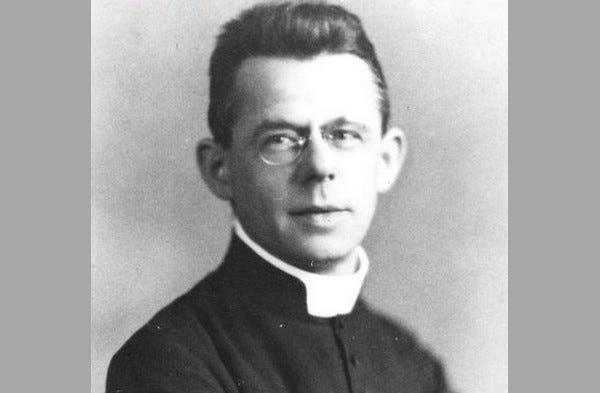In September 1903, after finishing his philosophy studies, Cardijn began his seminary theology studies.
What kind of a student was he? According to Marguerite Fiévez and Jacques Meert’s biography, he was an extremely active and brilliant student, who took part in all the major debates of the time. Here is the story they tell.
Tradition and Change among the Seminarists
How did the professors and students in the major seminary take to this bold and original student? Did they wonder how he would turn out after ordination? There was in his whole temperament and behaviour something quite unusual in a young man at the beginning of the century.
At the end of 1903 when Joseph Cardijn was beginning his theology, the seminary was in full ferment. It was the time of Loisy and modernism.
New methods of exegesis, Church history and even dogma provoked lively and worried debate. Developments of activities in the press and reviews, contact with leaders of the social movement, the Flemish movement, and the Social Weeks of France, were opening up new and exciting horizons.
Students were going to listen to Father Rutten and to take part in trade union congresses. Seminarists themselves wrote in the journals and some were going through an apprenticeship of action.
Two fellow students of Cardijn noted their recollections at some length:
“A group of us decided there should be a break with the strict isolation in which theological studies were carried on. Why should we be cut off from reading the press and have no library where we could get to know the currents of thought of our times?
From that time there was a kind of conspiracy among the students. First we had to get hold of a key to the professors' fine library. Then we threw ourselves enthusiastically into the reading of the Fathers of the Church . . .
As Joseph read a great deal, he was put in charge of the theology students' library; it was his job to give out the manuals and treatises they needed for their work. This enabled him to get hold of up to date works on scripture studies and circulate them in the seminary. He took the opportunity of reading them himself and recommending them to fellow students open to the problems of exegesis.
As head of his year, he was responsible, too, for contact between students and the authorities.
This gave him the chance of getting to know all the seminarists and having them in his room for long talks.
From this developed study circles in which the keener ones discussed the works of the Fathers and problems in the theology course among themselves during the evening recreation. Young Cardijn led the discussions and soon these budding theologians grew bold enough to put up objections to their lectures, culled from the treatises of St Augustine on grace. Joseph Cardijn showed up as a disputant with a rare faculty for theological penetration.
There was nothing wrong with any of this, thought there may have been some excess of enthusiasm. But it was always inspired by right motives and kept within limits. All the same the professors were worried. Problems threatened to break the calm monotony of teaching and they would ask “what had gotten into these young students?”2
We can see in the seminarist some of the dynamism of the years to come: Cardijn man of action, full of audacity and faith. His years in the seminary were above all years of a deepening of faith. In silence, prayer and reflection, the discoveries he had made earlier were filled out, given substance and tied in with his theology and with the demands of the Gospel.
In the seminarv all the religious formation received from that human educator, his mother, became deeply rooted in human realities. There in embryo was the man of faith, of inquiry and of action. For him there was no break or opposition between the humble family life of work at Hal and the years of intellectual and religious growth that were leading him to the priesthood. On the contrary, he was acutely conscious of the link between them.
SOURCE
Marguerite Fiévez and Jacques Meert, Cardijn, Chap. 2, Seminary (Joseph Cardijn Digital Library)


